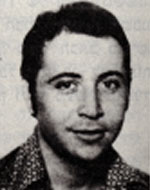Horenstein, David (Dudu)
David, son of Shifra and Shlomo, was born on February 1, 1950 in Tel Aviv and attended the “Geula” elementary school. He graduated from high school in the Montefiore Reali School. He even began attending evening classes at the Technion in electronics, but did not finish his studies. At school his uncle was always among the best students. “In all real subjects, he was always above and beyond all those around him, and he did not manage to ‘get off’ from grade 8-9,” said one of his classmates. “In discussions about current issues, his uncle was always the focus and always surprised his friends with his knowledge, until one day he told me his secret: ‘I read almost all the papers, so I’m in business,’ he explained to me. Reading newspapers was one of Dudu’s great hobbies, and he kept newspapers from periods of historical importance, such as the Six-Day War. His hobbies were shooting in the Gadna, collecting stamps, building electronic devices, watching the stars with his own telescope and fishing, and his uncle was a modest and introverted character, but all his friends saw these traits as his blessed virtues. “The difficulty was created to overcome it,” he used to say, and David was drafted into the IDF in mid-September 1968 and assigned to the Armored Corps. After completing his training at the Armored Corps School, he was awarded the rank of sergeant and was appointed as a guide and was subsequently trained as a tank commander. He was serious and responsible, and in my opinion these are two important characteristics for each commander, and he referred to every mission, even the smallest one. Another thing that caught my attention was the fact that he never asked for the release or deferral of reserve service for any reason, which is unusual for reservists … “In the Yom Kippur War, Dudu and his department were caught in a series Of severe braking battles in the Suez Canal sector. His uncle, Yitzhak Shmilowitz, spoke to him a few days before his fall. “It was hard for me to know what his uncle felt,” he said later. “The quietness, the efficiency and the willingness to help others made his uncle an excellent soldier and a great fighter, I say this not because he is no longer with us, But from the sincere and genuine appreciation of a member of the armed forces, and this feeling is the exclusive property of comrades in arms … “In one of the most brutal battles in the war that took place in the Canal sector on October 21, 1973, David was hit and killed. For six months he was considered missing until his body was discovered and he was brought to eternal rest in the military cemetery in Kiryat Shaul. After his fall, he was promoted to the rank of sergeant. Later, with the release of the reserve forces, his uncle’s commander wrote to the bereaved family: “Until now we have forcibly pushed the pain into hidden corners of the Lev and have continued our military activities. We will shake his hand and we can say to him: ‘See you in the following reserves – this thought is too much to bear.
